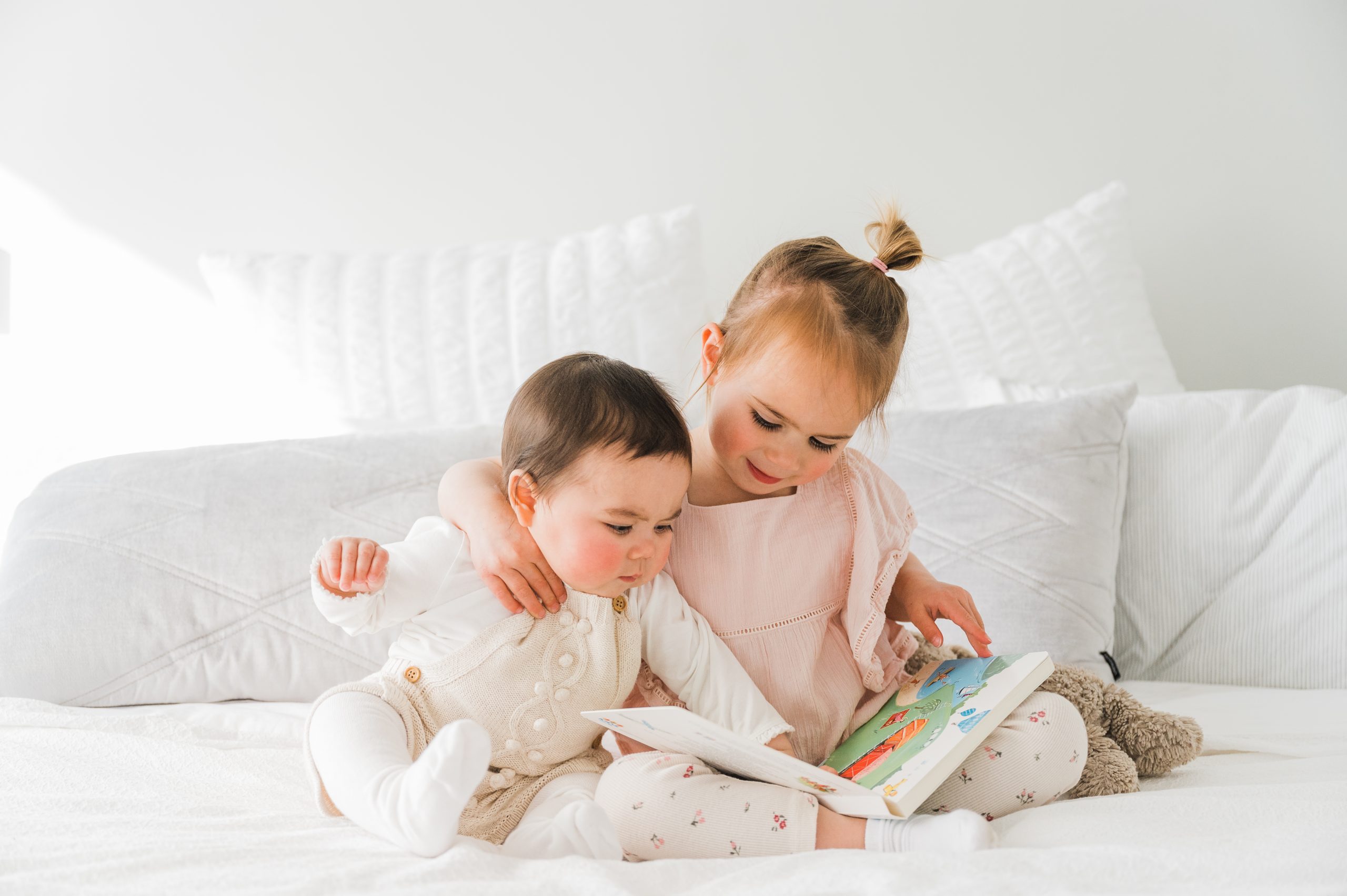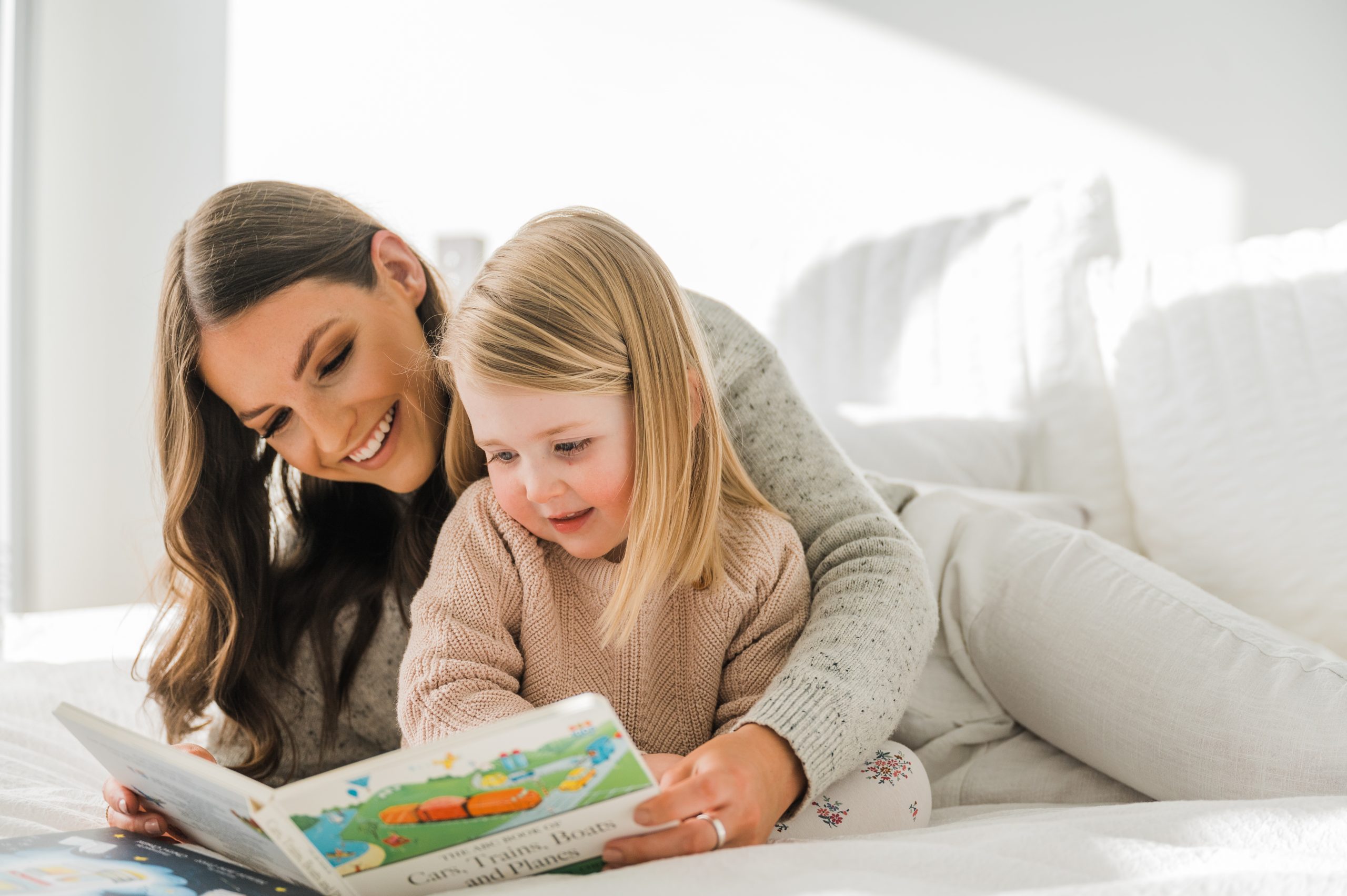The Rewarding Benefits of Reading to Babies

A recent review on the impact of infant reading revealed that 4 in 5 Aussie children between the ages of 0-2 were read to at least three times a week. How amazing is that?!
This study went on to compare the results of those children’s academic performance with non-reading families. Needless to say, the results were impressive!
With so many benefits of reading to babies, it’s clear to see why so many new mums and dads are putting aside time to read daily stories to their little ones. But is there really an advantage to storytelling with your newborn baby, or are they simply too young to benefit?
Follow along as we unpack this question to discover the benefits of reading to babies, as well as when and what to read to your growing bub!
The Benefits of Reading to Babies
To read or not to read – this should never be the question according to experts in key developmental studies. While children at different ages may see different developmental advantages from being read to, one thing is for certain. There’s no harm in starting early!
Let’s take a look at the key benefits you can expect when you read to babies of all ages.
Builds Connection and Closeness
Let’s face it, your newborn baby really doesn’t absorb much information from the book you’ve just read them. They do, however, get an incredible comfort out of the reading just by taking part in the event.
Your newborn baby loves the sound of your voice! It’s familiar from the womb and gives them a sense of comfort and security. Of course, finding things to chat about with your bub can be tricky. Reading gives you the perfect opportunity to cuddle up and give them exactly what they love … your voice!
This closeness helps form a bond for new parents and their little bub and encourages connection as they grow.

Teaches Baby About Communication
Next up, your baby will learn so much from reading purely based on your communication with them. It comes as no surprise to hear that everything outside of the sucking reflex and crying is a learned action. This means that in order to learn how to communicate, they’ll need to have a desire and understanding of why to communicate.
By hearing you read, respond, and react to the pages of a book, your baby will begin to understand the concept of communication. This may even prompt them to give it a try for themselves! Although those first communications are nothing more than sounds and faces, they are a giant step in the right direction for healthy development.
Social and Emotional Development
Another early benefit of reading to babies is the opportunity they gain to develop socially and emotionally at a young age. This early development can go on to make entering school and social situations much easier in the future.
By using expression and emotion when you read to your little one, they begin to pick up on these social cues and read emotion. That’s right: your baby has the potential to read emotion before they can read letters!
Promote Thinking Skills
Children under one year can get a head start on thinking and cognitive skills through your help with reading. Although they aren’t reading the words themselves, the encouragement to point, interact with pages and pictures, and ask questions is highly beneficial.
By asking questions yourself such as ‘where’s the cow’ or ‘what colour is this’, you’ll encourage your children to do the same. Although they may not be answering yet (or even understanding the question) this inquisitive nature is contagious for your little one!
Teach About the World Around Them
Books are amazing teachers. From helping your child understand things in their immediate life like eating or going to bed to growing their mind with outside elements like animals, reading provides the perfect chance for learning.
Beyond this, things as simple as touching, feeling, and even tasting their books can teach them about their surroundings. More importantly, they will begin to learn why we do the things we do (such as not eating books).
As they grow, this understanding becomes much deeper and the topics they can learn about expand. However, colours, shapes, and sounds are a perfect place to launch your little one’s learning!
Build Listening, Memory, and Vocabulary Skills
Believe it or not, listening, memory, and vocabulary skills will benefit greatly from your regular reading routine.
By establishing this routine early, your child will be more attentive to your reading sessions and develop their ability to sit and listen more effectively. This can go a long way when they start growing more independent and need a little more incentive to listen down the road.
Reading also encourages the memory to kick in. From remembering the colours on a page to the story itself, children can begin to exercise this memory muscle for better retention in their school days.
And of course, hearing the different sounds of their native language will encourage their vocabulary to form and grow (more on this later).
Set Them Up for Speaking and Reading

As we mentioned above, regular reading introduces a variety of sounds and words to your infant. With this in mind, your little one will have heard all of the sounds they need to know for speaking by the time they turn one year old.
By upping the repetition of these sound exposures through reading, your little one will have a better chance of remembering and attempting these sounds to develop their speech.
Beyond becoming clear communicators at an early age, children who are read to frequently tend to develop their own reading skills earlier. By listening and following along with photos, colours, and questions, your little ones begin to develop more of an interest in reading, too!
Improved Language Skills
When your child reaches the 6-12 month range, their desire to repeat and mimic will grow exponentially. This is where you’ll begin to notice the real impact of your reading on their language skills.
They may begin to connect names to pictures, learn new words, and hear and repeat the proper pronunciation of the words you use with them often. While many of us say words like mum, dad, eat, sleep, and bath often, the introduction of new words from books can speed up their path to adding this vocabulary to their repertoire as well.
Introduces Numbers, Letters, Colours, and Shapes in an Interesting Way
Finally, when it comes time to start learning the shapes, colours, numbers, and letters your child will need to know for school, reading can be an interesting and engaging way to encourage them.
While many parents will find equal success from pointing and teaching about objects as they go, reading about these things to your child early on may prompt a better memory of them for the future. Beyond this, the experience of reading together can simply make learning these things more fun!
When, How, and What to Read to Babies
When it comes to how to read to your baby, there’s not a whole lot you can do ‘wrong’. The concept is quite simple really. All you need is a cozy place to cuddle up and a physical book to flip through (leave your e-reader for your own books).
As your child becomes more inquisitive, it’s best to choose books that will stand up to little hands and mouths. We suggest opting for sturdy books with a variety of colour, texture, and sound (such as the beloved crinkly noise). This encourages touch and exploration that will contribute to that deeper understanding we mentioned earlier.
As you read, don’t forget to use lots of expressions! Changing the sound and frequency of your voice for different characters is not only entertaining for your little ones but helps them build those social skills for later.
Don’t be afraid to stray from the text to ask your little one questions, point out colourful pictures, or even make sound effects and gestures. Again, these are entertaining and educational tools! Don’t stress too much if you never make it to the end of the book; it’s the journey that counts.
And finally, repetition is key! Even if you are getting bored of the same books, your children are just beginning to understand them. The more often you read the same books, go over the same pages, and point out the same elements, the more likely their memory muscle is to kick in!
For added benefit, consider adding your reading to establish a routine. Reading before bedtime or nap time each day can form patterns that your little one will understand at a very young age. They’ll know it’s time to wind down and begin to drift off more easily (now that’s a win-win)!
Reading to Babies for Success
From forming that close connection in the early days to developing key life and learning skills for the future, the benefits of reading to babies are simply unbeatable. Whether you’re considering reading to your newborn baby or getting your growing toddler into the habit, we’re confident you’ll thank yourself for taking this step!
Want more parenting tips and advice for your bub? Check out our community today to learn from the experts and receive the valuable help and support you need to make parenting a breeze.
Please note: This article is designed to provide general advice for parents and guardians; for specific health advice, please consult with your child’s healthcare practitioner.



